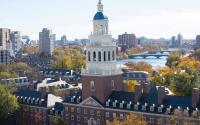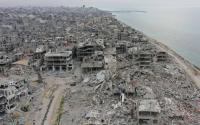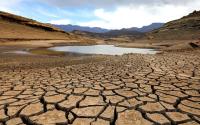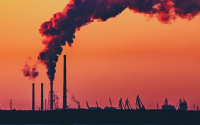9 July 2007Yahoo! NewsJoe Kafka
Dozens of families fled their homes as a wildfire raced out of a canyon in the Black Hills, destroying 27 houses and killing one homeowner who tried to go back to save some belongings, authorities said.
The fire near Hot Springs was one of dozens raging across the West. In the eastern Sierra, firefighters battling a 34,000-acre blaze ignited by lighting in California's Inyo National Forest gained ground as reinforcements arrived.
The 53-square-mile fire was 15 percent contained Sunday after cooler temperatures and lighter winds allowed firefighters to make their first real progress, Inyo National Forest spokesman Nancy Upham said. It skirted the popular John Muir Wilderness but destroyed at least one home on the mountainside above the town of Independence.
Lightning also sparked the fire in the Black Hills on Saturday. By Sunday, the blaze had consumed about 9 square miles, injured two firefighters and closed a section of a state highway, authorities said.
One person was killed trying to retrieve possessions from a home. The victim's identity was withheld pending notification of relatives.
"This thing blew up because of extreme hot temperatures and the winds," said Joe Lowe, South Dakota wildland fire coordinator. "It came out of the canyon with a vengeance."
Gov. Mike Rounds toured the area Sunday and noted that the trees around some houses were charred but the dwellings were intact.
"I don't know how in the world you saved some of those homes," he told firefighters.
More than two dozen homes had no damage because of a high-tech gel made of water-filled bubbles.
Elsewhere, a wildfire burning in the Los Padres National Forest in Southern California tore through more than 6,500 acres Sunday as it continued to move into the rural hills. A water-dropping helicopter crashed, and two pilots suffered minor injuries, Santa Barbara County Fire Captain Eli Iskow said.
The aircraft went down outside the fire lines and the cause was under investigation. All air traffic over the fire was grounded for the day, hindering the fight.
Investigators said the fire was ignited Wednesday by sparks from metal-grinding equipment being used on private property near Los Olivos.
In Utah, the largest wildfire in state history grew to 283,000 acres on Sunday. The blaze has swept through about 442 square miles of extremely dry sagebrush, cheat grass and pinion juniper in central Utah.
"This fire just ran away from us, and we couldn't put a dent in it," said Mike Melton, fire management officer for Utah's Division of Forestry, Fire and State Lands.
The fire burned along the edge and in the median of Interstate 15 on Sunday, forcing a 60-mile closure of the highway between Interstate 70 near Cove Fort and Beaver for nearly five hours, Utah Highway Patrol Lt. Steve Winward said. I-15 could be closed again if the wind shifts, he said.
In central Washington state, high wind near Wenatchee spread a brush fire that forced 250 to 270 homes to be temporarily evacuated. At least three outbuildings were destroyed by the 5,800-acre blaze.
A fire in Arizona burned at the base of a mountain that is home to several expensive telescopes. A spokesman at Kitt Peak told KSAZ-TV he was concerned but not alarmed. Tankers were dropping retardant between the fire and the observatory, the station reported.
In Nevada, about 1,500 evacuees from Winnemucca were allowed home hours after a wildfire destroyed an electrical substation and several outbuildings, shut down Interstate 80, delayed trains and killed livestock. No injuries were reported.
"It was pretty hairy for quite a while, and people thought they would go back to nothing," Humboldt County Undersheriff Curtiss Kull said Sunday. "It was a huge wall of flame coming at the homes. It's amazing that no homes were lost."
Flames up to 40 feet high threatened major power lines in the area feeding the eastern Sierra front and greater Los Angeles, fire information officer Jim Wilkins said.
A 45,000-acre fire in Idaho was contained Saturday, officials said. Crews on Sunday raced to repair fire-damaged transmission lines that threatened rotating power failures.
Other fires blackened the landscape in Colorado, Montana and Oregon.
___
Associated Press writers Marcus Wohlsen is San Francisco, Raquel Maria Dillon and Christopher Weber in Los Angeles, Jennifer Dobner in Salt Lake City, Martin Griffith in Reno, Nev., and Keith Ridler in Boise, Idaho, contributed to this report.






